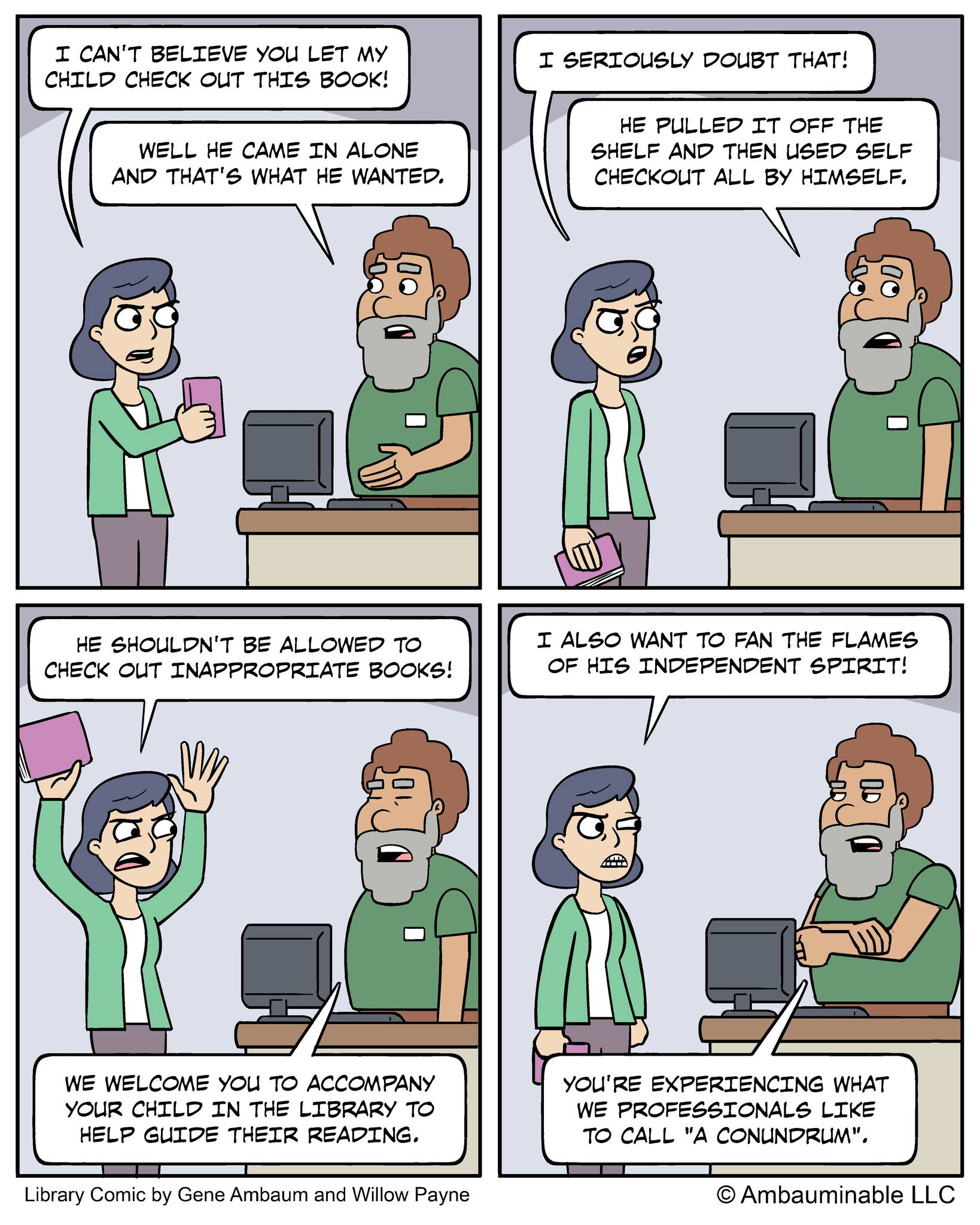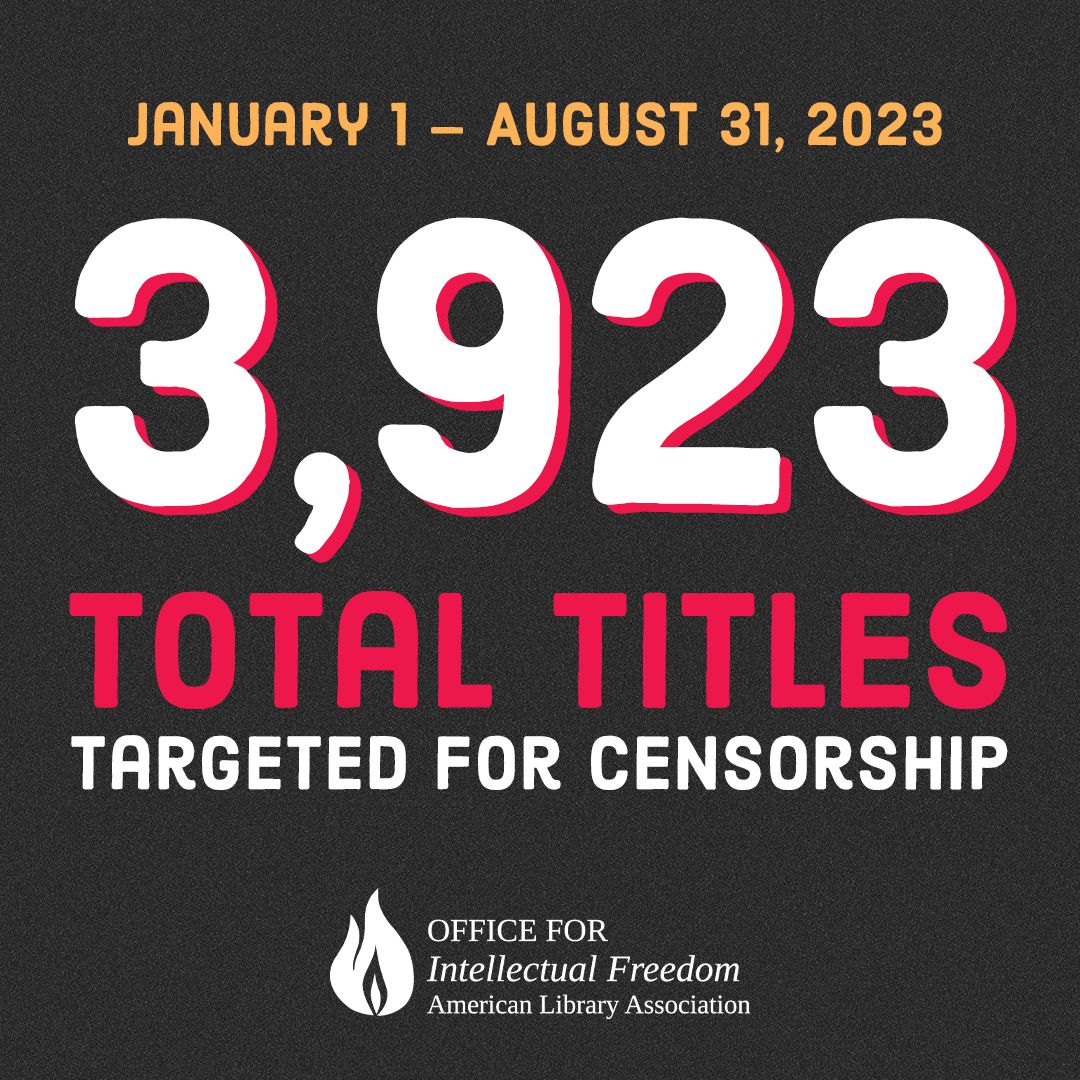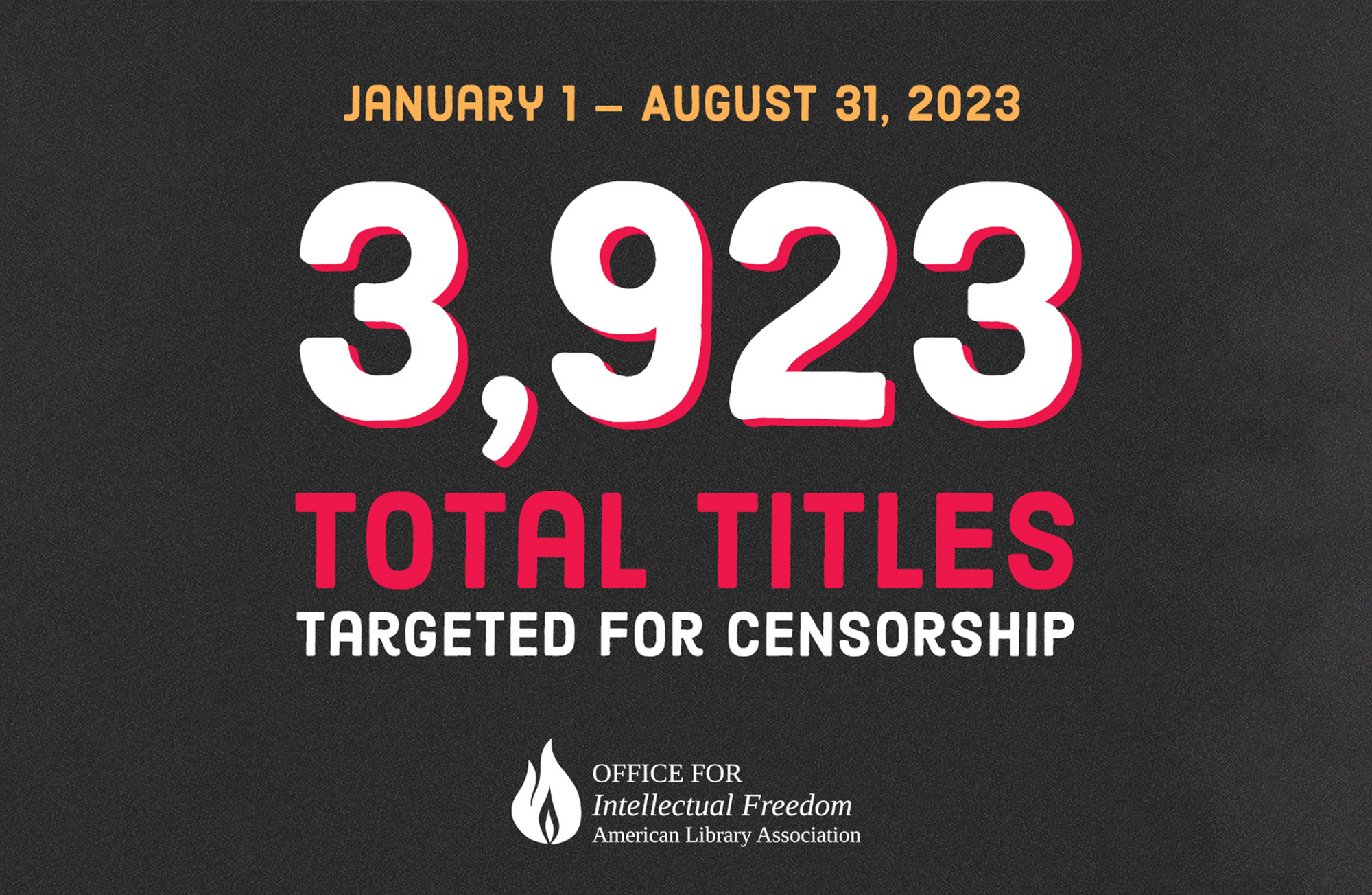But the incident brings to light an alarming march toward censorship throughout the nation, with increasing frequency in Washington.
You have the right to an opinion, but that does not make your opinion valid. Everyone's opinion is not weighted the same. We have experts that steer our policy, our public education, our medical needs, and our libraries.
Six years ago. Psychology Today wrote an article describing how there is a difference between facts and opinions. The same concept can be applied today to the clamors of the group against the library. While some books might be offensive to people, their opinion on what is appropriate does not matter as much as the rights of the public to access materials. This is one of the founding principles of the American Library Association (ALA).
Established on October 6, 1876 during the Centennial Exposition in Philadelphia, the mission of ALA is “to provide leadership for the development, promotion and improvement of library and information services and the profession of librarianship in order to enhance learning and ensure access to information for all.
The cries of extremist groups to ban books have a consistent (prescribed) tone; they say these books are “sexual”, “obscene”, “against traditional family values”, “anti-white”, and “anti-Christian”.
Luckily, the Supreme Court of the land made a ruling on obscenity 50 years ago in Miller v. California, which resulted in The Miller Test. It is illegal to distribute obscene materials to children. Relying on expert opinions to discern what is obscene and what is valid for the public should be left to experts — not the emotional opinions of a few, loud citizens.
Unfortunately, we are in a time when a vocal citizen can pursue the nuclear option. That is what happened in Dayton, Washington. A small group of citizens has decided that book banning isn’t enough for them.

The de facto spokesperson for the group is Jessica (Welch) Ruffcorn. Ruffcorn has lived in Dayton just about two years, and is a prolific social media poster. Over the last several years, she’s engaged in several fights over COVID shutdowns, pool closures in Prescott, and now, her epic battle over books in Dayton. In last month's Tumbleweird, the timeline of the events were discussed. To recap, Ruffcorn claims that she found around a dozen books that she deemed objectionable in the children’s section of the library.
Ruffcorn said In a press release dated September 5:
“Approximately 18 months ago, residents of Columbia County noticed sexually explicit books in our children’s library. Nobody could locate any local citizens who requested these books be placed in our library. …I, as well as others, began to protest. However, the number of books only continued to grow in our small library to well over 100. We petitioned the board to move books, but no action was taken.”
With help from the Columbia County Conservatives (CCC), Ruffcorn and others began gathering signatures for a ballot item to dissolve the Rural Library District. Ruffcorn claims that she was a former librarian and that she never gathered signatures herself, although members of a Dayton Washington group have posted screenshots that refute these claims. Ruffcorn has been repeatedly asked to tell her side of the story but has so far refused, although she did release a video statement shortly after being served with a lawsuit in September. Ruffcorn has hired attorneys from the Silent Majority Foundation (SMF) who are fundraising to pay for their legal advice for Ruffcorn and has this statement on their website:
“Concerned Parents and Community Members chose to stand up and demand their Public Library remove pornographic and immoral material from the Library's Children's section. When their concerns would not be heard they petitioned the local government to demand change. Now they are being targeted by lawfare. Donate to help defend these Concerned Citizens!”
Ellen Brigham Interim Director of Library Services
Ellen Brigham earned her Master of Library and Information Science (MLIS) degree in 2018 and moved to Dayton from Walla Walla to work at the Columbia County Library in 2021. To be a director of a library, you must have a MLIS.
The Dayton library is the only library in all of Columbia County, serving 40 to 100 people a day, says Brigham. The Dayton library employs three full-time staff, including the interim Director. They are open six days a week for a total of 41 hours. People from the community come in for a variety of materials, books, audio books, and magazines, or to use the computers or meeting rooms. The county is small — only around 4000 people live here — and the Columbia County Library is the only public building for the community in Dayton.
Brigham now serves as interim director after a tumultuous year that culminated with her former boss’ resignation in July. The trouble all started over a year ago in August 2022 when a small group of people (led by Ruffcorn) asked that a dozen books be removed from the library’s shelves. The group submitted the list of books — a process called a ‘request for reconsideration’. The book that was causing the most issue was What’s the T? A Guide to All Things Trans/Or Non-Binary By Juno Dawson.
The list of books for reconsideration was submitted first to the library director at the time, Todd Vandenbark. Director Vandenbark declined to ‘reconsider’ the books (remove them from the library system), so the group then asked the Library Board to reconsider the books, as well. The Library Board also declined to remove the books.
Brigham explained that the library already has a process to decide what books to purchase, and that collection development is one of the duties of the Director. Brigham uses a variety of sources to find materials, including lists from publishers and best sellers lists. The library also caters to what the community wants, Brigham explains, including a special section in the library that is for their large Christian community. The policy they use for collection development is published on their website. The opening paragraph of the policy states the following:
The vision statement of the Columbia County Rural Library District is to be an accessible and valued resource, committed and responsive to the lifelong learning and recreational needs of the entire community….
American democracy functions only if the full range of human ideas is accessible to the people and the principle of the First Amendment of the Constitution is guaranteed by being exemplified by American public libraries which provide access to those ideas in accordance with the Library Bill of Rights. The library collection is protected by the First Amendment, as a marketplace of ideas which are contained in varied and divergent materials. The library collection will be selected and maintained to provide materials which will enable each individual to acquire or to adapt the skills and knowledge necessary to participate in self-government, be productive, elevate economic stature, enhance humanity and contribute to enjoyment of life according to full exercise of free choice. The library collection will be an excellent and unbiased source of information. The library collection will include as wide a selection as possible, and subjects will be covered in sufficient depth to meet anticipated and expressed needs within budgetary constraints.
After the initial request to ‘reconsider’ the list of books, the group seeking to have them removed from the library brought another list forward, this time with around 100 books. Brigham says that some of the 100 books are not in the Dayton library at all, but declined to speculate about where the list came from. However, one resource cited by the book banners is Book Looks, which has been linked with Moms For Liberty.
In March, after the Columbia County Library did not give in to their demands, the Dayton group against the library, wrote a ballot initiative and began gathering signatures to dissolve the library district altogether.
The rural library district has statutory limitations about who can be taxed and who can vote on whether the district will be dissolved, which means that only a small minority of people who use the library will be able to vote on whether or not it closes.
To help inform the community of Dayton about the situation, Brigham published a Director’s Corner of the CCRLD (Columbia County Rural Library District) Newsletter where she attempts to explain who the American Library Association is and what they do:
The American Library Association (ALA) was founded in 1876 with the mission "to provide leadership for the development, promotion and improvement of library and information services and the profession of librarianship in order to enhance learning and ensure access to information for all.” It is the oldest and largest library organization in the world!
Who's in charge of the ALA?
The Council is the governing body of the ALA, and determines all policy.
What does the ALA do?
Advocacy & Public Policy: The ALA advocates for library funding, broadband internet funding, fair use of copyrighted materials, privacy, intellectual freedom, and literacy.
Grants & Scholarships: The ALA has dozens of grants awarded to libraries and librarians. In 2022 our library was awarded a $20,000 grant for COVID relief that we used to offset materials purchases, buy craft materials, and cover technology and Family Storytime expenses.
Education & Resources: ALA has lots and lots of webinars for library workers to use for their continuing education. They also make a lot of library posters, bookmarks, and more. Remember those READ posters from your childhood library? The ALA makes those!
Does the ALA tell us what books to buy or what policies to enact?
No. The ALA produces some "best of" book lists that we take note of, but we are not required to follow those. All of our policies are developed and voted on by our library Board of Trustees. The 1939 Library Bill of Rights and the 1953 Freedom to Read Statement written by the ALA inform several of our policies, but all policies regarding our library are created by the board.
Jay Ball, Library Board President
Jay Ball is the owner of Jay’s Garage in Dayton Washington and President of the Columbia County Library Board. He is a long-time volunteer in Dayton, a town he has lived in for 23 years. Originally from Akron, Ohio, Ball has spent many years serving his community. He was on the Library Board 15 years ago when they joined the Rural Library Association in 2008.
At the time, the city of Dayton ran the library. They had a smaller budget and a smaller staff. It was open on a more limited basis and hadn’t updated its materials in a long time. There are over a dozen rural library districts in the state, and the laws governing how they are run might surprise voters in Columbia County and Dayton.
The city of Dayton was not able to fund a fully functional library and chose to join the district so they could get a larger tax base (although Ball says the library takes less than the maximum allowable tax rate). By joining the Rural Library District (RLD), the library was able to update their collection, hire more employees, and be open for more hours. They have certified librarians in Dayton, something that is important to Ball.
Ball says the Library Board spent many long nights figuring out what the future of the library would be when they joined the RLD. After joining, the library was able to expand their services, and Ball felt it was in good hands. He moved on to join the Planning Commission for the county, and after about a decade, he came back to the Library Board. Ball says:
“I came back in ‘21. I was finishing ten years on the county planning commission. The library had an opening and the chair asked nicely for me to return. Helping in the early days was one of the volunteer highlights of my life. We are heroes. What could go wrong?
[After] 22 years we are under attack. Never could have dreamed it up in a bad nightmare. The future of America can be seen in miniature here in Columbia County. Many good people are standing up.”
Now, the Columbia County Library has a professional staff, most with masters degrees, including interim Director Ellen Brigham, the librarian who took over after the last director resigned.
The majority of the budget for the library goes to the staff, who on average make about $25/hour, less than what Ball says he pays the mechanics that work in his garage.
Ball, who was appointed to serve on the Library Board by the County Commissioners, managed to serve during some tough times, including the COVID years. But this past year when the book banning group began demanding that the library remove books, the Library Director at the time, Todd Vandenbark, took a firm stance against removing the materials.
Ball said the Board stood behind their Library Director. It was his library to run, after all. A year of name calling, literal bible thumping at board meetings, and division followed.
Then came Proposition 2, which would dissolve the Columbia County Library District.
A political action committee called Neighbors United for Progress (NUFP) filed an injunction to stop the measure from moving forward. Superior Court Judge Julie Karl ruled that the proposition is invalid and issued a temporary restraining order to block the ballot measure until a scheduled court date of September 20. The NUFP said in their August 29 press release: “Proposition 2 is censorship by another name, but the legal issues are straightforward, and we believe we will prevail. There should be no taxation without representation.”
According to the Dayton Auditor, “The unincorporated Rural Library district has 1076 active voters. The City of Dayton has 1707 active voters. At this point Columbia County has 2881 active voters.” But because of the way the district is set up, if the injunction rules in favor of Proposition 2 moving on to the ballot and it is approved by a majority of voters, it will only take 539 votes to dissolve the library that thousands of patrons use.


Infographics: ala.org
For Elise Severe, one of the members of NUFP, this is bigger than just one library.
"Why am I fighting this fight? I've asked myself that very question many, many times because I want to be sure I am in this for the right reasons and not selfish ones.
The society we live in right now is filled with fringe groups who perform well in aggressive combative situations. In the national media, they are emboldened by high ranking politicians promoting these behaviors and pushing fine tuned narratives encouraging outrage.
In many churches, we have leaders promoting hate and distrust in people who they view as not adhering to their conservative Christian values and beliefs.
I choose to fight this fight because I KNOW we — as a community and as a society — can do much better. Our success lies somewhere in the middle. That ‘middle ground’ is not found with an all-or-nothing approach. It is found by leaders who approach decisions with the entire community in mind and never with their personal ideologies.
When people raise their voices to ban books or close down entire public libraries under the guise of “saving the children” they are saying that they are the moral compass, and parents do not know how to protect or parent their own children.
I fight this fight because I love my three girls and they deserve better. The beautiful town I grew up in knows how to work together for the success of the community. Yes, there are a few hundred people who are determined to tear down vital institutions and demonize new ideas and projects. But there are thousands of people who understand the true meaning of working together for the success of the community."
One of the Legislative Representatives of the district, Mary Dye, agreed to talk regarding fixing the RCW but was unable to meet before the deadline.
Columbia County Library saved
On September 20, Columbia County Superior Court Commissioner Julie Karl ruled for the NUFP. The initiative will not be on the ballot in November. Karl was the Judge referenced by Ruffcorn in the video statement made at the first of the month in which she called Judge Karl a “liberal that wouldn’t follow the law.” During her comments, Karl called Ruffcorn’s initiative unconstitutional and invalid. “We did away with taxation without representation a long time ago,” she said. Karl also referenced “potential criminal acts” during signature gathering.
Book challenges continue across the country. Sometimes the Republican legislators threaten to ‘defund’ the libraries. Moms for Liberty continue to send out their book target lists, and increasingly it is librarians — especially public school librarians — facing the challenges.
Here in Richland, a local librarian said last week that the abrupt increase in attempted book bans has been alarming:
“Pre-2020, we were ranging between 200–300 a year. In 2021, it was somewhere around 1800 different books. 2022 was 2500. We're on track to be even higher this year. And the books they are going after are deliberately targeted. It used to be that you'd get a request to remove one or two at a time. Now they're hitting out with lists. Identical lists. With identical language in the requests. And they clearly haven't read any of the books.”
And they won't stop until more folks like Jay Ball and Elise Severe stand up for their communities.
To see the American Library Association’s list of banned and challenged books, visit ala.org/advocacy/bbooks/book-ban-data
Lifelong resident of Eastern Washington, Dori enjoys the outdoors, her family, and making good trouble. She has worked in broadcasting and reporting and believes in the value of the 4th estate. She is a true community advocate that loves Washington.


